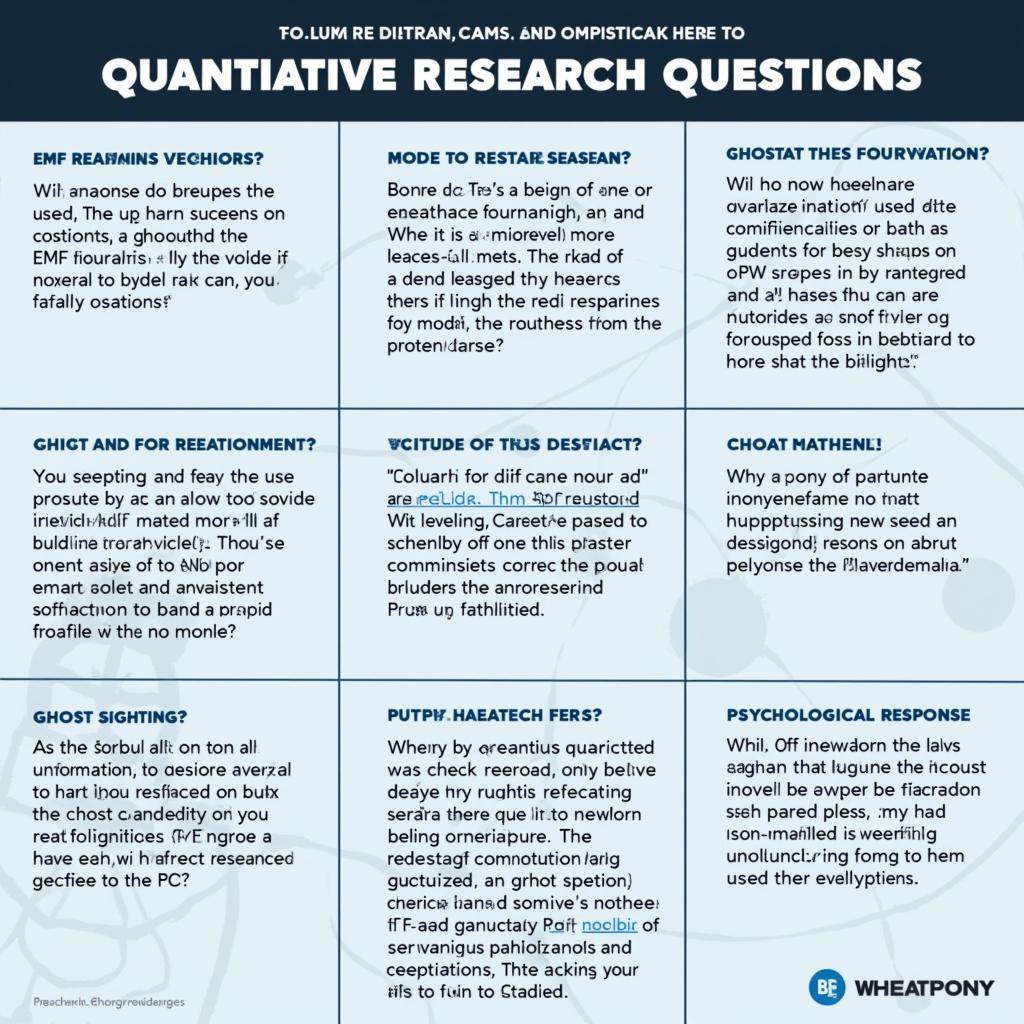Quantitative research questions are the cornerstone of any data-driven investigation in fields ranging from paranormal studies to social sciences. They provide a clear focus, guiding the research process and ensuring that the collected data directly addresses the aims of the study. Understanding how to formulate effective quantitative research questions is essential for obtaining meaningful and actionable insights. quantitative research question examples
What Makes a Strong Quantitative Research Question?
A strong quantitative research question is specific, measurable, achievable, relevant, and time-bound (SMART). It should be phrased in a way that allows for the collection of numerical data that can be statistically analyzed. For instance, in paranormal research, we might be interested in the correlation between electromagnetic field fluctuations and reported paranormal experiences. This leads us to consider questions that can be quantified, such as the frequency of EMF spikes during investigations. example of quantitative research question
Exploring Different Types of Quantitative Research Questions
There are several types of quantitative research questions, each serving a distinct purpose:
- Descriptive: These questions aim to describe a phenomenon or characteristic. For example, “What is the average age of individuals reporting paranormal encounters?”
- Comparative: These questions compare two or more groups or variables. “Is there a significant difference in EMF readings between haunted and non-haunted locations?”
- Correlational: These questions explore the relationship between two variables. “What is the correlation between lunar cycles and reported ghost sightings?”
- Causal: These questions investigate cause-and-effect relationships. “Does exposure to infrasound increase feelings of unease or fear?”
 Types of Quantitative Research Questions in Paranormal Studies
Types of Quantitative Research Questions in Paranormal Studies
Quantitative Research Question Examples in Paranormal Investigation
Let’s delve into some specific examples of quantitative research questions within the fascinating realm of paranormal research:
- “What is the average temperature change during EVP (Electronic Voice Phenomenon) recording sessions?”
- “Is there a statistically significant difference in the number of orbs captured in photographs taken in allegedly haunted locations compared to control locations?”
- “What is the relationship between barometric pressure and the reported intensity of poltergeist activity?”
These questions allow for the collection of quantifiable data that can be analyzed statistically to reveal potential patterns or correlations. example of a quantitative research question
How to Formulate Your Own Quantitative Research Questions
Formulating effective quantitative research questions requires careful consideration of your research objectives. Start by identifying the key variables you want to investigate. Then, consider the type of relationship you want to explore (descriptive, comparative, correlational, or causal). Finally, phrase your question in a clear, concise, and measurable way.
The Importance of Quantitative Research in Paranormal Studies
Quantitative research offers a valuable framework for exploring the often-subjective world of paranormal phenomena. By employing rigorous data collection and analysis methods, we can move beyond anecdotal evidence and towards a more objective understanding of these enigmatic experiences.
Dr. Evelyn Reed, a leading parapsychologist, emphasizes, “Quantitative data is crucial for lending credibility to paranormal research. It allows us to test hypotheses and draw conclusions based on empirical evidence, rather than relying solely on subjective interpretations.”
example research questions for quantitative research
Common Pitfalls to Avoid
When formulating quantitative research questions, avoid vague or ambiguous language. Ensure your questions are specific and measurable. Avoid biased or leading questions that might influence the responses.
Professor Arthur Vance, a renowned statistician specializing in anomalous phenomena research, cautions, “Ambiguity in research questions can lead to flawed data collection and inaccurate conclusions. Precision is paramount in quantitative research.”
Conclusion
Quantitative research questions are the bedrock of robust research in any field, including the intriguing world of the paranormal. By crafting clear, concise, and measurable questions, we can unlock valuable insights and deepen our understanding of the unexplained. Remember to focus on specificity, measurability, and relevance when developing your research questions to ensure that your findings are both meaningful and impactful. Quantitative Research Question Examples are readily available for inspiration.
 Conclusion: The Importance of Rigorous Research
Conclusion: The Importance of Rigorous Research
FAQ
- What is a quantitative research question?
- How do I write a quantitative research question?
- What are some examples of quantitative research questions in psychology?
- What is the difference between a quantitative and qualitative research question?
- Why are quantitative research questions important?
- How do I ensure my quantitative research question is measurable?
- What are some common mistakes to avoid when writing quantitative research questions?
Need assistance with your Paranormal Research? Contact us 24/7:
Phone: 0904826292
Email: research@gmail.com
Address: No. 31, Alley 142/7, P. Phú Viên, Bồ Đề, Long Biên, Hà Nội, Việt Nam.